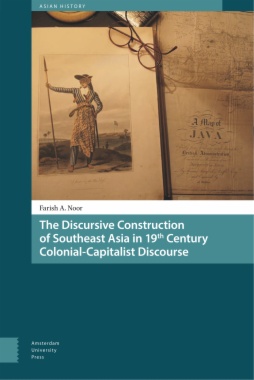The nations of Southeast Asia today are rapidly integrating economically and politically, but that integration is also counterbalanced by forces ranging from hyper-nationalism to disputes over cultural ownership throughout the region. Those forces, Farish A. Noor argues in this book, have their roots in the region's failure to come to a critical understanding of how current national and cultural identities in the region came about. To remedy that, Noor offers a close account of the construction of Southeast Asia in the nineteenth century by the forces of capitalism and imperialism, and shows how that construct remains a potent aspect of political, economic, and cultural disputes today.
- Cover
- Table of Contents
- A Note on the Language, Spelling and Pagination of Quotations
- 1. Introduction
- Booking Southeast Asia: The History of an Idea
- 1.a Book about Books, and Where to Find Southeast Asia
- 2. Booking Southeast Asia: And So It Begins, with a Nightmare
- 2.a Thomas de Quincey and the Malay from an Antique Land
- 2.b From Boemus to Theodorus de Bry and Sir Walter Raleigh: The East Indies in the Kingdom of God
- 2.c According to the Logic of the Modern Company: The Ordering of the East Indies by Johan Nieuhof
- 2.d From Nightmare to Knowledge: Coming to Know Southeast Asia
- 3. The New Language-Game of Modern Colonial Capitalism
- 3.a Racialised Colonial-Capitalism as the New Language-Game of the Nineteenth Century
- 3.b Headhunters, Cannibals and Pirates: Othering Southeast Asia
- 4. Raffles’ Java as Museum
- 4.a Knowing Java and Preserving Java: Thomas Stamford Raffles’ Great Venture
- 4.b True after the fact: Raffles’ History of Java as a Justification for British Expansionism
- 4.c Raffles’ History as a Catalogue of Dutch Errors
- 4.d From Conqueror to Curator: Raffles’ Java as a Museum of the Javanese
- 4.e You’ve Been Mapped: Raffles’ Map of Java as the Victory of Modernity
- 4.f The Conquest of Java’s Land and History: Raffles’ History as a Work of Epistemic Arrest
- 4.g Southeast Asia as the Stage for Self-Reinvention: The Legacy of Raffles’ History of Java
- 5. Dressing the Cannibal: John Anderson’s Sumatra as Market
- 5.a Pleasing the Company: John Anderson’s Search for Sumatran Clients
- 5.b A-Data-Mining We Will Go: John Anderson Embarks on His Fact-Finding Mission to Sumatra
- 5.c Carefully Does It: Anderson’s Careful Research on Sumatra
- 5.d Sumatra Surveyed: The Perceptible Gaze of the Invisible John Anderson
- 5.e John Anderson and the Reconfiguration of Sumatra as a Market
- 6. Brooke, Keppel, Mundy and Marryat’s Borneo as ‘The Den of Pirates’
- 6.a Colonialism and the Necessity of the Pirate
- 6.b Enter the Privateer: James Brooke Goes A-Hunting for a Kingdom to Call His Own
- 6.c Enter the Pirate: The Native Pirate as the Constitutive Other to Western Colonialism
- 6.d The ‘Pirate Menace’ Realised: The Instrumentalisation of the Borneo Pirate in the Writings of Captains Keppel, Mundy and Marryat
- 6.f Knowing Borneo, Knowing the Pirate: Confirmation Bias and Closing the Argument in the Writings of Keppel, Mundy and Marryat
- 7. Crawfurd’s Burma as the Torpid ‘Land of Tyranny’
- 7.a Meddling with Burma: John Crawfurd and the East India Company’s ‘War on Tyranny’
- 7.b Snodgrass Sets the Tone: Framing Burma as Both a Threat and a Prize
- 7.c Weighed Down by the Maudlin Tyrant: Crawfurd’s Static Burma
- 7.d Now on to the Real Intelligence: Crawfurd’s Data-Gathering Mission
- 7.e Locating Tyranny: Crawfurd’s Mapping of Burma
- 7.f From Land of Tyranny to Theatre of the Grotesque
- 7.g And Thus Was Burma Known: Tyrants, Freaks and the Epistemic Arrest of Burma
- 8. Bricolage, Power and How a Region Was Discursively Constructed
- 8.a Books in the Era of Gunboat Epistemology
- 8.b Against the Coloniser’s Pen: The Internal Critique of Colonial-Capitalism
- 8.c ‘And Others Become Obsolete and Forgotten’: The Demise of the Language-Game of Racialised Colonial-Capitalism
- 8.d Conclusion: The Power behind the Idea of Southeast Asia
- Appendix A
- The Full Transcript of the Article by William Cobbett on the Subject of the British Invasion of Java
- Appendix B
- Keeping an Eye on the Javanese: Raffles’ ‘Regulations of 1814 for the More Effectual Administration of Justice in the Provincial Courts of Java’
- Appendix C
- James Brooke’s Detractors in the British Parliament and the Aborigines’ Protection Society
- Appendix D
- The Clash between the HMS Dido and the Ships of the Rajah of Riao: A Case of Mistaken Identity and Misappropriation of the Signifier ‘Pirate’
- Appendix E
- The Construction of the Native Other in the Writings of Hugh Clifford, British Colonial Resident to Pahang
- Bibliography
- Index

